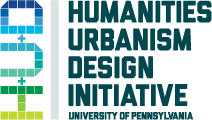H+U+D Invites Applications for 2021-22 Mellon Doctoral Dissertation Fellows—01.05.21
Mellon Doctoral Dissertation Fellows 2021-22
Application deadline: February 28, 2021
The initiative in Humanities, Urbanism, and Design (H+U+D) at the University of Pennsylvania is a ten-year project funded by the Andrew W. Mellon Foundation to foster critical and integrative consideration of the relationship between the humanities and the design professions in the analysis and shaping of the built environment. Under the renewed grant (which began in 2018), the initiative takes “The Inclusive City” as its theme, focusing on issues of inclusivity and diversity. The program has a number of component parts, including a bi-weekly Faculty Colloquium, the sponsorship of graduate and undergraduate courses, student research funding, an Undergraduate Colloquium, special lectures, participation in conferences, a Doctoral Dissertation (ABD) Fellowship program, and a Junior (postdoc) Fellowship program. For more information on the initiative see: http://www.humanitiesurbanismdesign.com/
Applications are now invited for two one-year Doctoral Dissertation Fellowships to be held in 2021-22. One fellow will be selected from humanities and humanistic social science graduate groups in the School of Arts and Sciences, and one will be selected from the School of Design.
Mellon Doctoral Dissertation Fellows will be selected on the basis of the excellence of their work and their ability to contribute to the mission of the initiative. Preference will be given to projects related to the “Inclusive City” theme.
Eligibility
Applications are invited from doctoral students in good standing at the University of Pennsylvania in all humanistic and design disciplines whose work deals with the built environment of cities, landscapes, and architecture and who wish to expand its inter-, trans-, and multidisciplinary character. Applicants must have completed three years of study and attained “ABD” (all-but-dissertation) status by May 31, 2021. Awards made prior to the attainment of ABD status are contingent on that attainment.
The University of Pennsylvania values diversity and seeks talented students, faculty and staff from diverse backgrounds. The University of Pennsylvania does not discriminate on the basis of race, color, sex, sexual orientation, gender identity, religion, creed, national or ethnic origin, citizenship status, age, disability, veteran status or any other legally protected class status in the administration of its admissions, financial aid, educational or athletic programs, or other University-administered programs or in its employment practices.
Terms of appointment
The fellowship stipend is $30,300. Enrollment in the university’s graduate student health insurance program will be provided for the fellow, but not for family and dependents. Tuition and fees will be paid by the fellow’s school.
During the academic year of the award (August 31–May 10), fellows are required to be in residence in Philadelphia and work full time on their dissertation project. They must participate in the bi-weekly H+U+D Faculty Colloquium and present their research at one of its sessions.
Application Guidelines
Applications and letters of reference must be received by 11:59 P.M. EST on February 28, 2021. All materials should be sent to Ms. Alisa Chiles, H+U+D Program Manager (mellon-hud-initiative@groups.sas.upenn.edu).
Applications should be assembled as one PDF comprising:
- cover sheet (Word document template available here: HUD Doctoral Fellow_Application Cover Sheet 2021-22)
- curriculum vitae
- unofficial Penn transcript
- short dissertation proposal (1000 words maximum)
Your PDF and the email that conveys it should be titled <Your last name> HUD application; e.g., Applicantname HUD application
Also arrange for the following two supporting letters to be sent by the February 28 deadline:
- a letter of endorsement from the chair of your Graduate Group, certifying your ABD status
- a letter of reference from your dissertation advisor, discussing your research proposal
These must be sent directly to Ms. Chiles (mellon-hud-initiative@groups.sas.upenn.edu). The letters should be in the form of PDFs, and the PDFs and the emails that conveys them should be titled <applicant’s last name>_<Reference writer’s last name> HUD reference;
e.g., Applicantname_Advisorname HUD reference
Address Questions to
Daniel A. Barber barberda@design.upenn.edu
and Andrea Goulet agoulet@sas.upenn.edu
Download Application Cover Sheet

 Ty Redden joins the Mellon H+U+D Initiative from Gettysburg College, where she was Assistant Professor of Africana Studies. She is a graduate of Savannah State University and the University of Florida, having earned a Ph.D. in Design, Construction & Planning with specializations in race studies and housing policy. Her research explores development-forced displacement driven by mega-sporting events. Ty is a frequent presenter at the Association of Collegiate Schools of Planning and the Urban Affairs annual conferences, and is co-author of “Building the Foundation for Arnstein’s Ladder: Community Empowerment through a Participatory Neighborhood Narrative Process” in the forthcoming volume, Learning from Arnstein’s Ladder: From Citizen Participation to Public Engagement (co-edited by M. Lauria and C. Slotterback). She is appointed in the Department of Africana Studies (School of Arts and Sciences).
Ty Redden joins the Mellon H+U+D Initiative from Gettysburg College, where she was Assistant Professor of Africana Studies. She is a graduate of Savannah State University and the University of Florida, having earned a Ph.D. in Design, Construction & Planning with specializations in race studies and housing policy. Her research explores development-forced displacement driven by mega-sporting events. Ty is a frequent presenter at the Association of Collegiate Schools of Planning and the Urban Affairs annual conferences, and is co-author of “Building the Foundation for Arnstein’s Ladder: Community Empowerment through a Participatory Neighborhood Narrative Process” in the forthcoming volume, Learning from Arnstein’s Ladder: From Citizen Participation to Public Engagement (co-edited by M. Lauria and C. Slotterback). She is appointed in the Department of Africana Studies (School of Arts and Sciences). Syantani Chatterjee, who recently completed her PhD in Anthropology at Columbia University, is an anthropologist specializing in questions of urban citizenship and belonging in India. Her book project, which builds on her dissertation, examines the social worlds of the residents of Shivaji Nagar (Mumbai), also known as “Bombay’s Gas Chamber.” Her interest in exposure, and embodiment is reflected in her earlier field research among commercial gestational surrogates in India. In her award-winning Master’s Thesis at Columbia University, Caste in a New Mold: The rematerializing of caste in the biomedical universe of commercial surrogacy in India, she studied the emergence of new configurations of caste, and the endurance of earlier forms of the same in contemporary India, from within biomedical practices and discourses. Prior to pursuing doctoral studies, Chatterjee worked as a journalist for Reuters, the Associated Press and CNN. Her scholarship has received generous support from the American Institute for Indian Studies, Columbia University’s Lindt Dissertation Fellowship, and other endowments. Her publications appear in the International Journal of Labor and Working Class History, and PoLAR. She is appointed in the Department of Landscape Architecture (Weitzman School of Design).
Syantani Chatterjee, who recently completed her PhD in Anthropology at Columbia University, is an anthropologist specializing in questions of urban citizenship and belonging in India. Her book project, which builds on her dissertation, examines the social worlds of the residents of Shivaji Nagar (Mumbai), also known as “Bombay’s Gas Chamber.” Her interest in exposure, and embodiment is reflected in her earlier field research among commercial gestational surrogates in India. In her award-winning Master’s Thesis at Columbia University, Caste in a New Mold: The rematerializing of caste in the biomedical universe of commercial surrogacy in India, she studied the emergence of new configurations of caste, and the endurance of earlier forms of the same in contemporary India, from within biomedical practices and discourses. Prior to pursuing doctoral studies, Chatterjee worked as a journalist for Reuters, the Associated Press and CNN. Her scholarship has received generous support from the American Institute for Indian Studies, Columbia University’s Lindt Dissertation Fellowship, and other endowments. Her publications appear in the International Journal of Labor and Working Class History, and PoLAR. She is appointed in the Department of Landscape Architecture (Weitzman School of Design).